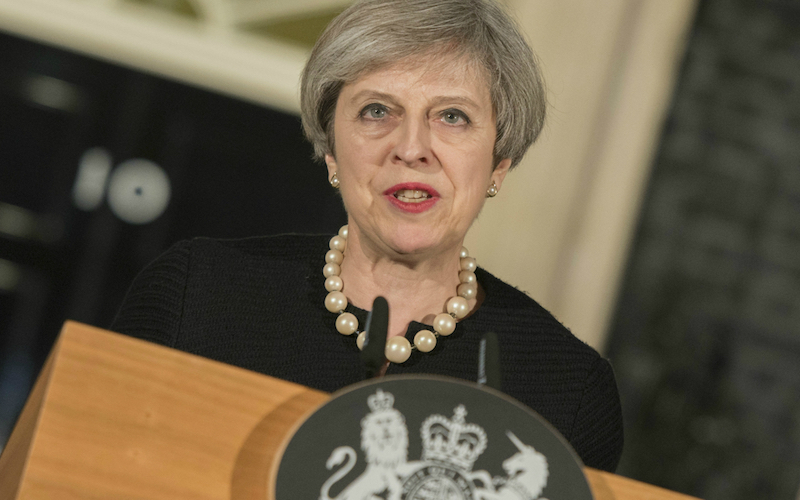
Brexit Train Crash
Theresa May’s Brexit strategy is a shambolic mess. After months of dodging the bullet regarding Britain’s future relationship with the European Union since the Brexit referendum, the only glimpse of clarity is that Britain will be opting for a Hard Brexit, leaving the European Union (EU) single market.
Britain is expected to enforce Article 50 of the Lisbon Treaty before the end of this month which will start the formal two year process of negotiations on the future relationship between Britain and the European Union. If a divorce settlement negotiation with 27 other European governments wasn’t enough of an undertaking for the United Kingdom, Scotland’s Prime Minister Nicola Sturgeon’s calls for a new independence referendum will further complicate the Brexit proceedings.
To add to the uncertainty, House of Commons Foreign Affairs Committee has criticized the government for failing to prepare for the failure of the two year formal negotiation period between the United Kingdom and the European Union, as a result of which there will be a ‘no deal’ – an outcome which seems very likely. According to a Bloomberg News analysis, the remaining 27 EU governments may have differing priorities, but are adamant that the United Kingdom does not receive a ‘free lunch’ and want the chief negotiator, Michel Barnier, the bloc’s chief negotiator, to drive a hard bargain.
The European Union plans to keep the United Kingdom waiting as soon as the Article 50 is invoked. This is evident from the cancellation of plans of the EU governments to meet on April 6 to agree on the negotiating guidelines for Michel Barnier, the European Commissions’ Brexit negotiator. Instead, they have rescheduled the meeting later in April or the month after. As a result, Theresa May will lose leverage as soon as the negotiations are initiated. Delaying tactics of the European Union may also exert more pressure on Theresa May. The longer the negotiations continue without an agreement between the two parties, the more pressure the British Prime Minister will feel to accept any kind of terms she is offered. In such a case, the U.K. government has been very vocal about walking away with nothing rather than accept a ‘bad deal.’ That would be economic suicide for the United Kingdom.
For a more beneficial and positive agreement between the U.K. and the European Union, Theresa May requires the goodwill of its EU partners which seems to be in short supply. According to a memo circulating within the German government, EU governments are urged not to be divided because the “foremost priority” must be to protect the bloc’s cohesion. It also emphasized that Britain should be made to feel the difference between life inside and outside the bloc. Furthermore, populists around Europe called for a referendum of their own after Brexit vote last year. The French presidential elections are a case in point. While French Presidential candidates Emmanuel Macron and Francois Fillon have vowed to exact Brexit negotiations, Marine Le-Penn has proposed for a so-called Frexit (Frances’ divorce with the EU). This would prompt the EU to take an even tougher stance to dissuade the French and other European countries to exit the bloc too. Theresa May’s borderline arrogant bravado since the Brexit referendum hasn’t helped the situation either.
Furthermore, a two year time frame for pulling United Kingdom out of the European bloc, negotiating new relationships with Europe and the rest of the world are bound to be a huge undertaking. To put things in perspective, Europe is the largest economy in the world with a population of nearly 500 million people, which is even larger than America’s population of 325 million people. Europe also represents the world’s largest market, 17 percent of the world trade and accounts for half of the world’s foreign assistance. It also boasts 27 universities which are ranked in the top 100 worldwide. While American per capita income is higher, Europe is an economic peer in terms of human capital, technology and expertise.
These are facts that the U.K. government needs to seriously consider before it proceeds to the negotiation table. The U.K. government seeks a new trade deal with the European Union, which would allow it access to the European single market. On the other hand, the European governments have made it clear that they will not allow Britain to cherry pick areas of cooperation. If Britain aspires to stay a part of the European single market, it will have to contribute to the European budget and allow free movement of people; demands which would go against the Brexit mandate.
Theresa May faces various threats on the internal and external fronts which could play havoc with Britain’s future. While many assertions have been made by May’s government of their preparedness, yet there has been little evidence to support those assertions. Politics are about to get decisively more difficult for Theresa May.

